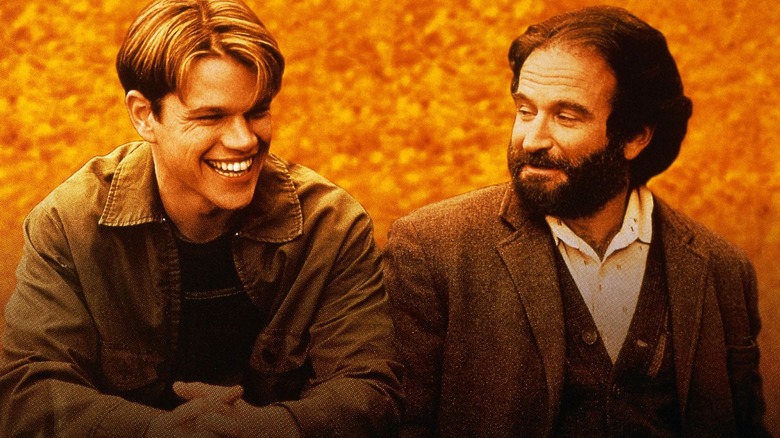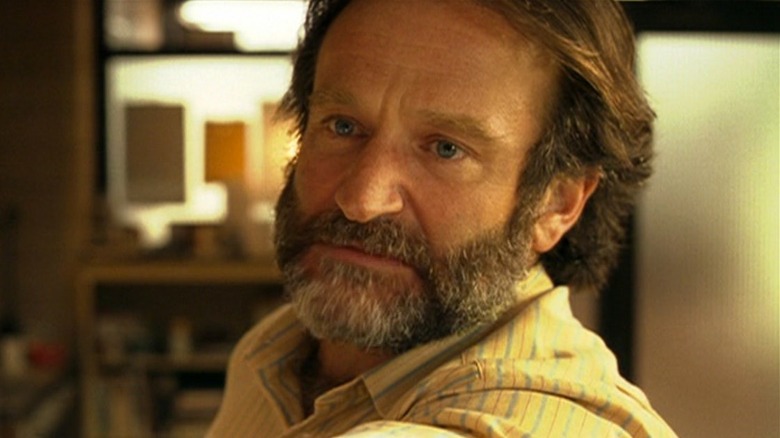Harvey Weinstein Shortened Good Will Hunting's Theatrical Release To Screw Over Robin Williams
Producer Harvey Weinstein had a reputation as someone who didn't care who or what he had to trample on his way to the top. Besides the monstrous sexual assault charges for which he is currently imprisoned, he was known colloquially in Hollywood circles as "Harvey Scissorhands" for the way he would mutilate certain films in editing that he either made himself or acquired for U.S. distribution. Often when directors fought back against such cuts, as Jim Jarmusch did on "Dead Man," Weinstein would simply dump the film or keep it on a shelf. He also had no issues with wielding a heavy, intrusive hand during production, even with established filmmakers like Wes Craven or Martin Scorsese.
This kind of vindictive behavior was apparently not limited to films he felt were commercial liabilities. In fact, former Miramax house director Kevin Smith has opened up to The Daily Beast about a particularly ugly bit of business involving one of the studio's biggest hits, 1997's "Good Will Hunting," on which Smith was an executive producer. It involves Weinstein intentionally pulling the film from theaters early to save them from having to give Robin Williams (who won an Oscar for his performance as a therapist) more back-end cash.
"Why would you pull it if it was just making money?"
Here is the full quote about the "Good Will Hunting" situation from Smith, who spent the first 15 years of his career working almost exclusively for the Weinsten brothers:
"I remember they pulled that movie out of theaters while it was still earning at the time. It was doing incredibly well, and the deal that they'd made with Robin was a high-percentage first-dollar gross—a movie-star deal—and it was great, because instantly by putting Robin in the movie their pre-sales paid for the whole f***ing film. So, the movie was paid for and then the movie was making money hand over fist and made over $100 million. From what I remember, Robin's split would be even greater and he'd get a bigger percentage if it crossed $100 million, so every dollar the movie made at the theatrical box office would have to be split—I'm not sure if it was a 50/50 split—with Robin Williams. I was on the movie as a co-executive producer, so we were privy to some details, and I remember the day when 'Good Will Hunting' was leaving theaters and it felt weird because it was like, 'Wait? There's all this Oscar buzz, so why would you pull it if it was just making money?' And they did it because keeping it in theaters meant that more of the money would go to Robin, whereas the moment it went to video the split wasn't Robin-heavy. It was hamstrung because greed."
While the story is certainly believable, according to The Numbers, "Good Will Hunting" seemed to have a natural progression during its long theatrical life where it grossed $138 million stateside and $225 million globally. But one thing that does line up is that the theater count for the film did begin to drop precipitously right after the Academy Awards on March 23, 1998. A better strategy may have been to increase the theater count after the awards triumph, something they had done on other films like "Shakespeare in Love," but clearly the Weinsteins chose not to.
This would not be the last time the Weinstein brothers would screw the late Robin Williams out of a paycheck. In 2003, Williams was scheduled to reunite with both his "Good Will Hunting" co-star Matt Damon and "The Fisher King" director Terry Gilliam for "The Brothers Grimm" in the sidekick/antagonist role of Cavaldi, but the Weinstein's low-balled him on his offer to such an extent that he walked away from the movie, infuriating Gilliam. Williams was replaced by Peter Stormare.

